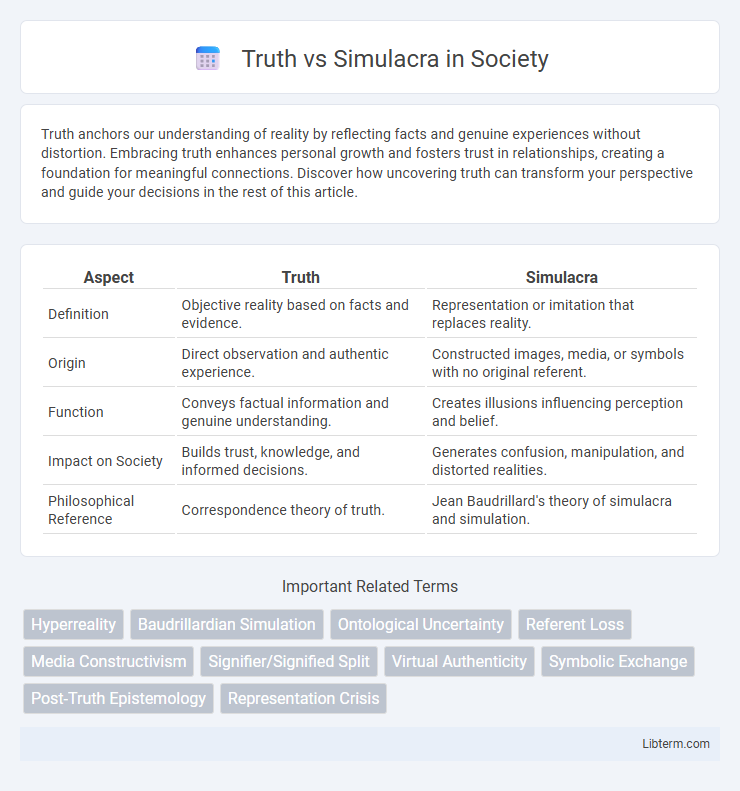Truth anchors our understanding of reality by reflecting facts and genuine experiences without distortion. Embracing truth enhances personal growth and fosters trust in relationships, creating a foundation for meaningful connections. Discover how uncovering truth can transform your perspective and guide your decisions in the rest of this article.
Table of Comparison
| Aspect | Truth | Simulacra |
|---|---|---|
| Definition | Objective reality based on facts and evidence. | Representation or imitation that replaces reality. |
| Origin | Direct observation and authentic experience. | Constructed images, media, or symbols with no original referent. |
| Function | Conveys factual information and genuine understanding. | Creates illusions influencing perception and belief. |
| Impact on Society | Builds trust, knowledge, and informed decisions. | Generates confusion, manipulation, and distorted realities. |
| Philosophical Reference | Correspondence theory of truth. | Jean Baudrillard's theory of simulacra and simulation. |
Defining Truth in Philosophy
Truth in philosophy is often defined as the property of statements or beliefs that accurately correspond to reality or facts, known as the correspondence theory of truth. Alternative theories include the coherence theory, where truth is determined by the consistency and integration of beliefs within a system, and the pragmatic theory, which defines truth in terms of practical consequences and usefulness. Philosophers like Plato emphasized truth as an objective form, while modern thinkers explore its complex relation to perception, language, and power structures, highlighting challenges in distinguishing truth from simulacra or representations.
Understanding the Concept of Simulacra
Simulacra refer to copies or representations that have replaced or distorted the original reality, creating a hyperreality where distinctions between truth and imitation blur. Understanding simulacra involves recognizing how images, signs, and symbols no longer reflect authentic experiences but instead generate new meanings detached from any real-world counterpart. This concept, rooted in Baudrillard's theory, challenges traditional notions of truth by highlighting the dominance of simulated realities in contemporary society.
Historical Roots of Truth and Simulacra
The historical roots of truth trace back to ancient philosophy, where figures like Plato emphasized an objective reality beyond perception, contrasting with simulacra, which have origins in postmodern theory, particularly Jean Baudrillard's exploration of hyperreality and the blurring between reality and its representations. Truth historically functioned as a correspondence between statements and actual states of affairs, while simulacra challenge this by presenting copies without originals, creating a simulated reality detached from tangible truth. These concepts evolved through epistemological debates and cultural shifts, highlighting the tension between authentic knowledge and reproduced images or signs in contemporary society.
Jean Baudrillard: Theorist of Simulacra
Jean Baudrillard's theory of simulacra explores the collapse of the boundary between reality and representation, where simulations replace and distort truth, creating hyperreality. He argues that contemporary society is dominated by signs and images that no longer refer to any authentic reality, resulting in a world governed by simulacra that mask the absence of a tangible truth. Baudrillard's work critically examines media, consumer culture, and technology as forces that perpetuate these illusions, challenging traditional notions of truth and authenticity.
Truth in the Age of Media Hyperreality
Truth in the age of media hyperreality becomes a contested and fragmented concept as digital platforms proliferate simulated realities that blur fact and fiction. Hyperreal media environments prioritize spectacle and narrative over empirical evidence, challenging traditional epistemologies and prompting a shift towards interpretive and performative truth claims. This phenomenon reflects a culturally constructed truth shaped by algorithms, mediated experiences, and the saturation of images, complicating the pursuit of objective knowledge.
The Collapse of Distinction: Truth vs Illusion
The collapse of distinction between truth and illusion signifies a profound shift in contemporary culture where simulated realities increasingly overshadow authentic experiences. Jean Baudrillard's concept of simulacra illustrates how representations no longer refer to any real object but instead create a hyperreal environment in which truth is indistinguishable from its copy. This erosion of boundaries complicates the pursuit of objective truth, as the proliferation of media and digital technologies fabricate realities that shape perception rather than reflect it.
Simulacra’s Impact on Perception and Reality
Simulacra distort perception by replacing authentic experiences with copies that lack original meaning, altering how reality is understood. This phenomenon causes individuals to interpret the world through fabricated representations rather than direct encounters, leading to a blurred boundary between reality and illusion. The prevalence of simulacra in media and culture transforms social consciousness, making truth subjective and reality increasingly hyperreal.
The Search for Authenticity amid Simulation
The search for authenticity amid simulation underscores the tension between genuine experiences and fabricated realities shaped by media and technology. Simulacra, as described by philosopher Jean Baudrillard, represent copies without an original, challenging perceptions of truth in a hyperreal world. This phenomenon disrupts traditional notions of authenticity, compelling individuals to discern reality from illusion in increasingly simulated environments.
Societal Consequences of Simulacra Dominance
The dominance of simulacra in society leads to a pervasive erosion of authentic human experiences, as individuals increasingly interact with representations detached from reality. This disconnection fosters alienation and undermines social trust, hindering meaningful communication and collective action. The proliferation of hyperreal images and narratives reshapes cultural norms, often prioritizing appearance over substance and distorting perceptions of truth.
Navigating Truth in a World Full of Simulacra
Navigating truth in a world dominated by simulacra requires discerning authentic experiences from mere representations that mimic reality without substance. The proliferation of hyperreal images and narratives challenges individuals to critically evaluate sources and differentiate genuine information from fabricated simulations. Embracing media literacy and philosophical inquiry enables a deeper understanding of how truth is constructed and perceived amidst layers of imitation.
Truth Infographic

 libterm.com
libterm.com